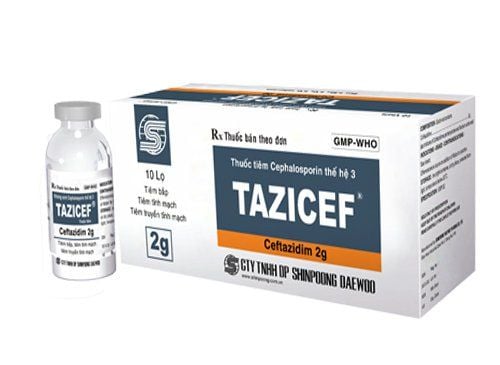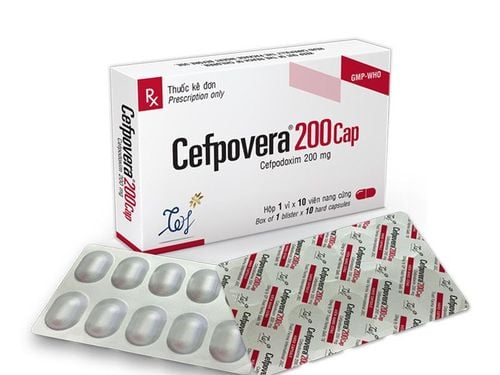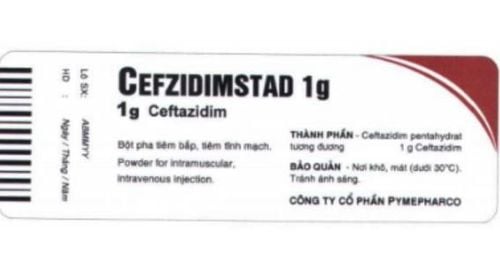This is an automatically translated article.
Amzedil 1000 is indicated for the treatment of common infections. So how is Amzedil 1000 used? Read the article below to get more information about the effects and precautions of using this drug.
1. What is Amzedil 1000?
Amzedil 1000 contains the main ingredient Ceftazidime 1000mg and excipients just enough provided by the manufacturer.
Dosage form: Powder for injection. Packaging: Box of vials and tubes.
2. Uses of Amzedil 1000
Amzedil 1000 is indicated for the treatment of cases such as:
Lower respiratory tract infections. Skin and skin structure infections. Urinary tract infections . Bone and joint infections. Gynecological infections. Abdominal infection. Central nervous system infections, including meningitis. In addition, Amzedil 1000 is contraindicated for treatment in patients with hypersensitivity to the active ingredient Ceftazidime or other excipients in the composition of the drug.
3. Dosage and how to use Amzedil 1000
3.1. Dosage Dosage depends on the severity of the disease and the patient's condition. Below is the recommended dosage of Amzedil 1000:
Adults: 0.5-2g/day, 2-3 times a day.
Urinary tract infections and other infections of moderate severity: use at a dose of 0.5-1g, taking the drug every 12 hours. Most infections: 1g every 8 hours or 2g every 12 hours. Very severe infections, especially in immunosuppressed patients, including neutropenia: 2g every 8 or 12 hours. Patients with cystic fibrosis (patients with infectious pulmonary cystic fibrosis with normal renal function): 100-150mg/kg/day, divided into 3 times daily. Adults with normal renal function can take a maximum dose of 9g/day. Patients with hepatic impairment do not need to adjust the dose. Children and infants:
Children over 2 months old: usual dose 30-100mg/kg/day, divided dose into 2-3 times per day. For children with infections due to immunosuppression, cystic fibrosis or meningitis can be used at a dose of 150mg/kg/day (maximum dose 6g/day) divided into 3 doses per day. Infants under 2 months of age: 25-60mg/kg/day, divided into 2 doses. Elderly patients:
The usual daily dose should not exceed 3g, especially patients over 80 years old. Patients with renal impairment: based on creatinine clearance to calculate dose and duration of administration for specific patients:
Creatinine clearance 50 - 31ml/min, administered at a dose of 1 gram, administered once every 12 hours. Creatinine clearance 31-16ml/min, administered at a dose of 1 gram, administered every 12 hours. Creatinine clearance 15 - 6 ml/min, administered at a dose of 500 grams, once every 12 hours. Creatinine clearance < 5 ml/min, administered at a dose of 500 grams, once every 24 hours. 3.2. How to use Amzedil 1000 is prepared in the form of a powder for injection, administered by intravenous infusion or deep intramuscular injection.
Method of preparation:
Solution for intramuscular injection: Mix the drug with a dose of 1g in 3ml of distilled water for injection, or 0.5% or 1% lilocaine hydrochloride solution. Solution for intravenous injection: Mix the drug with a dose of 1g in 10ml of distilled water for injection, or 009% sodium chloride or 1% dextrose solution. Intravenous solution: Mix Amzedil 1000 in solutions as in intravenous injection but with a concentration of 10-20mg/ml (1-2g drug in 100ml of solvent).
4. Side effects of Amzedil 1000
Before prescribing, doctors always weigh the effectiveness benefits that Amzedil 1000 brings more than the risk of unwanted effects in patients taking the drug. However, some cases when using Amzedil 1000 may still occur undesirable effects as follows:
Common:
Injection site reactions such as swelling, pain. Itching, rash, gastrointestinal disorders, thrombophlebitis . Uncommon:
Headache, dizziness, fever, Quincke's edema, anaphylaxis, thrombocytopenia, leukopenia, lymphocytosis, positive Coombs' reaction, taste disturbances, sensory disturbances. In patients with renal failure, improper treatment may cause convulsions, encephalopathy, tremors, and neuromuscular excitability. Abdominal distention, loss of appetite, diarrhea, nausea, vomiting. Rare:
Hemolytic anemia, pseudomembranous colitis, erythema multiforme, Steven-Johnson syndrome, toxic skin necrosis, increased transaminases, increased urea and plasma creatinine. While taking the drug, if the patient experiences the above undesirable effects or the unusual signs are suspected to be related to the drug, immediately notify the doctor for specific advice.
5. Amzedil 1000 . drug interactions
Please list and inform your doctor about all medications you are taking such as prescription drugs, over-the-counter drugs, functional foods, herbs... to avoid possible interactions when combination of different drugs.
The following are some drugs that have the potential to interact with Amzedil 1000 when used in combination such as:
When used in combination with Aminoglycoside drugs or strong diuretics such as furosemide, there is a risk of nephrotoxicity. Therefore, in case of needing long-term treatment with Amzedil 1000, it is necessary to periodically monitor the patient's renal function. Chloramphenicol is a viro-antagonist with Amzedil 1000, so the combination should be avoided when bactericidal action is required.
6. Some notes when using Amzedil 1000
Here are some notes when taking Alloflam 100 to help achieve the effectiveness of the drug as well as reduce the risk of side effects:
Patients with a history of hypersensitivity to active ingredients Ceftazidime, Cephalosporins and Penicillins. There is a possible risk of pseudomembranous colitis in patients when taking the drug. In patients with renal impairment, the total daily dose should be reduced based on creatinine clearance as well as clinical symptoms. When taking Amzedil 1000 in high doses, there is a risk of causing convulsions, loss of balance, and neuromuscular excitability. Caution should be exercised in patients with a history of gastrointestinal disease, especially dysentery. Amzedil 1000 may reduce prothrombin activity in patients with renal, hepatic or malnourished patients. Use in pregnancy and lactation should be considered, unless specifically directed by a physician because the potential benefit outweighs the potential risk to the fetus and nursing infant. . It is necessary to report the side effects of the drug such as headache, dizziness to drivers and operating machines.
7. How to deal with missed dose, overdose of Amzedil 1000?
What to do if you miss a dose of Amzedil 1000?
Take another dose as soon as you remember, maybe 1-2 hours after the usual time. If the time of remembering is close to the time of taking the prescribed medication, do not take the missed dose, take the next dose as directed. Do not make up for a double missed dose. What to do in case of an overdose of Amzedil 1000?
When overdose, patients may experience symptoms such as convulsions, tremors, and neuromuscular excitability. The patient should be immediately taken to the nearest emergency center for monitoring and supportive treatment. If the patient has kidney failure, hemodialysis or peritoneal dialysis can be given to remove the drug from the body quickly. Above is the important information of Amzedil 1000, carefully reading the instructions before use and strictly following the doctor's instructions will help patients use the drug effectively and safely.
Follow Vinmec International General Hospital website to get more health, nutrition and beauty information to protect the health of yourself and your loved ones in your family.
Please dial HOTLINE for more information or register for an appointment HERE. Download MyVinmec app to make appointments faster and to manage your bookings easily.













